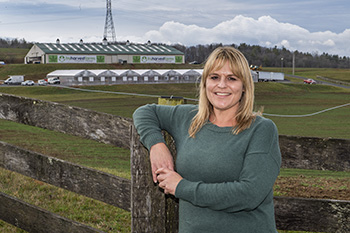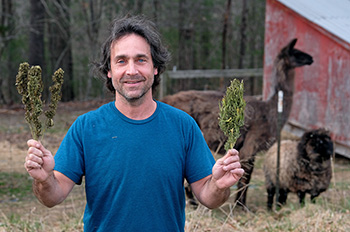Cash crop?
Hemp growers find crowded, uncertain market
Petunias, plants, strawberries, meat, tomatoes and more have been the primary revenue sources for Rolling Meadows Farms during the past 31 years. Tim Belcher took over the 400-acre Martinsville family farm in 1989 after his father retired.
Now, the farm has a new product line and Belcher has high hopes that it could run neck and neck with his produce, plants and meat business — eventually.
The new line, coined Virginia Pharm Health, includes cannabidiol (CBD) oils and creams made from hemp that Belcher grows at the farm and processes at a Blacksburg facility. The products are meant to relieve pain, and Belcher says they are working. For example, one of his customers purchased the cream to relieve her husband’s knee pain after doctors could not help him.
“The first day, it knocked his pain out,” says Belcher, who sells the products online and at the Historic Roanoke City Market, where he is a regular vendor. “She says it’s the only thing that works.”
Belcher is one of more than 1,300 growers in Virginia registered to grow industrial hemp, a strain of the Cannabis sativa L. plant typically grown as a fiber or as edible seeds. Belcher’s story is a microcosm for the hemp industry in Virginia, where the number of growers is surging and processing facilities are cropping up to meet the demand.
The number of people who registered to become industrial hemp growers in Virginia started off at 589 in April 2019, right after state legislators legalized industrial hemp production, says Elaine Lidholm, director of communications for the Virginia Department of Agriculture and Consumer Services (VDACS). (Virginia requires that all industrial hemp growers, producers and dealers register with VDACS.)
By the end of 2019, there were 2,200 acres of hemp planted in Virginia, with the largest acreage concentrated in Chesapeake and Mecklenburg and Caroline counties.
“It’s a unique crop and one that growers find a lot of potential in,” says Erin Williams, a senior policy analyst with VDACS who was involved in reviewing the state’s hemp legislation. The 2014 and 2018 federal Farm Bill, adopted by Virginia, requires that industrial hemp contain less than 0.3% THC, the compound found in cannabis plants that gives marijuana its psychoactive properties.
It’s still early to determine the future of the commonwealth’s hemp growing industry, Williams says. As of late February, Virginia had submitted its state hemp plan, which establishes regulations for the next year, to the U.S. Department of Agriculture for approval.
Comparing data from the first couple of years may provide a sense of whether the hemp industry will be sustainable in the commonwealth, she says.

TruHarvest’s coordinator of production and marketing.
New revenue stream
It’s clear that some hemp growers in Virginia are finding early success in the young industry. In particular, tobacco farmers in Southern Virginia are growing hemp to supplement declining tobacco sales. There are different reasons for the sales slowdown, including increased tariffs on international trade and a general decline in cigarette consumption, says Tony Banks, senior assistant director with the Virginia Farm Bureau’s Department of Agriculture Development and Innovation.
“We saw some massive declines in tobacco production last year,” Banks says. “We lost about 35% of the production we had the year before. Folks in the tobacco belt are looking at hemp as a possible replacement.”
But it hasn’t been a boom crop for all. Some growers are concerned that the market became oversaturated too quickly. There is still much uncertainty with hemp and its business potential.
“The market is almost still being birthed,” Banks says. “We are far from having any sort of maturing market. It’s very fluid.”
In the past year, Matt Hagan, owner of TruHarvest Farms in Montgomery County, jumped headfirst into the hemp business. The champion drag racer and beef cattle farmer not only expects to plant more hemp this year, but he is building a 30,000-square-foot greenhouse for in-house propagation of the plant.
Last year, TruHarvest grew 85 acres of hemp, making it one of the largest hemp farms in Virginia. In 2020, it plans to add 15 acres, says Kelli Scott, coordinator of production and marketing for TruHarvest.
Hagan, she says, “was looking at this as a way to diversify the farm, to get a potential new revenue stream. It’s an innovative, interesting industry to get into.”
As of mid-February, TruHarvest had not yet produced products made from its hemp. This year it plans to develop topical products, such as creams and items for oral consumption, Scott says. Some of that production could happen at the farm in the future.
“It’s like farm-to-table, going from field to a shelf-stable product,” Scott says.
Small beginnings
Other Virginia farmers are growing hemp on a smaller scale.
Belcher planted five acres of hemp, but he has plans to increase his sales of the crop in various forms. He is building two greenhouses to support all of his farm’s business, including hemp. Right now, he is experimenting with making coffee containing kief, a powder derived from organic compounds and cannabinoids found on cannabis flowers.
Belcher got his start by growing hemp clones, which are seedlings, and selling them to farmers to cultivate. In fact, Belcher and some hemp growers formed their own co-op about a year ago, and they hope to turn it into a full-scale hemp operation.
Starting small is key, says Jackson Cox, who in 2018 founded a side venture, Nelson County-based Rockfish Hemp, dedicated to the crop. He works as a subcontractor with farms looking to get into the business. Cox, a carpenter who grows and sells plants, initially began working with James Madison University to grow hemp for research.
“The business sprouted up on its own,” Cox says. “I saw a need for consultation. Farmers want somebody to come and tell them what they could do to diversify what they already have growing.”
Several hemp-processing facilities are opening or have announced plans to open across the commonwealth.
One of these, Appalachian Biomass Processing, an industrial hemp fiber processing center, announced in October its plans to open in Wythe County. During the next three years, the company plans to buy more than 6,000 tons of industrial hemp grown in Virginia at a value of more than $1 million. TruHarvest Farms in Montgomery County is also adding processing capabilities. Other processors in Virginia include Shenandoah Valley Hemp in Elkton, which is processing hemp into CBD oil products, and Solidarity Hemp, a Floyd County growers’ group that is working on creating a CBD processing facility. A Colorado hemp processing company was also exploring locating operations in Chesapeake last year.
When and whether more of these facilities open will be telling for hemp’s future, Banks says.
“Processing is the big bottleneck for a market to take off for hemp,” he says. “Once the Food and Drug Administration begins to make announcements regarding how they may treat foods and dietary supplements that contain CBD, that’s going to provide some clarity. That may encourage some processors to go ahead and begin to open facilities.”
Flooded market

Still, some farmers are hesitant about jumping into hemp cultivation.
It requires steep investments in time and resources and could be risky for some farms, particularly small operations. Michael Frank, owner of the 6-acre Full Moon Farm in Sperryville, is a registered Virginia hemp grower, but he’s not confident that he will make money from the plant.
He planted hemp seeds and has grown them to sell as seedlings, but he hasn’t yet had them tested for CBD or THC content, an expense that could total about $100 a plant, he says.
“It’s hard on a small scale to make money with it,” says Frank, whose farm focus is producing and processing culinary food grade essential oils and dried herbs. “The market is now flooded; and a lot of people don’t even know what to do with the product that we have.”
Even so, a flooded market isn’t all bad, says Jason Amatucci, founder and executive director of the Virginia Industrial Hemp Coalition, a grassroots advocacy organization.
“It’s part of a free market economy,” says Amatucci, who started the coalition in 2012. “There will be winners and there will be losers.”
The coalition is pushing for the state to increase the 0.3% limit on THC content required for industrial hemp to 1%. That’s because it is difficult for some growers to keep hemp’s THC below the 0.3% threshold, Amatucci says. Increasing the limit would keep growers from having to destroy their crop if the THC content is on the cusp of the limit. Marijuana has a 15% to 20% THC content, says Amatucci, who argues that people cannot get high using a product with 1% THC.
A team at JMU continues to seek answers about the industry and its future.
Samuel Morton, an associate professor of engineering, along with students and other faculty at the university, plan to research the hemp market and the state’s production infrastructure with a yearlong grant from the state’s GO Virginia economic development initiative. The program provides incentives for collaboration between businesses, education and government to strengthen the state’s economy.
Morton and his team will look at best practices for hemp growing, production and infrastructure by studying Shenandoah Valley hemp growers.
“Our goal is to help the entities that will be making those decisions have the best information to make them,” he says. “What I don’t want to have is a lot of farmers who get out into this high-risk space with insufficient information and find more financial trouble than what they began with.”
s






















